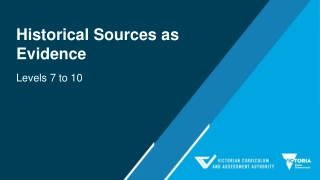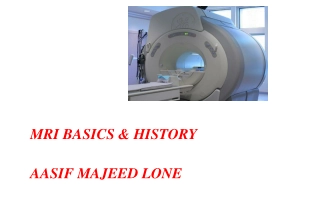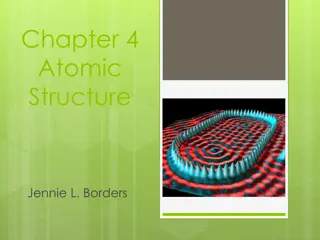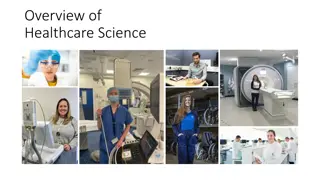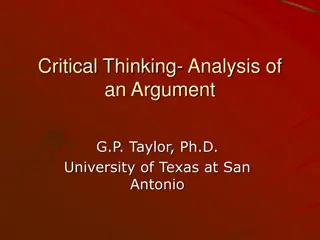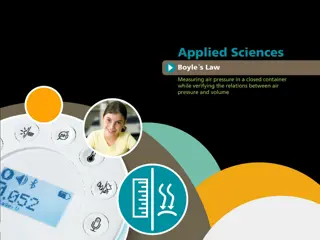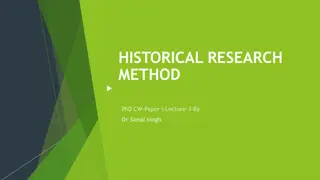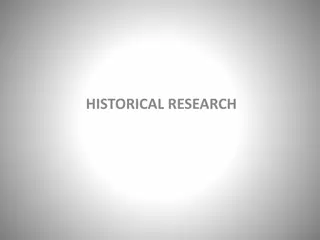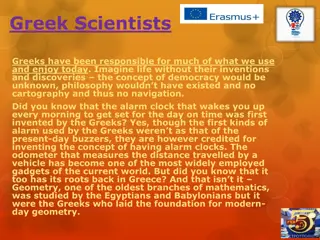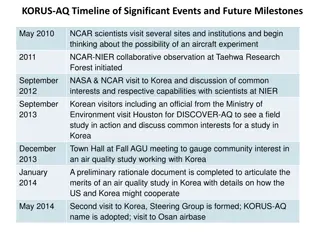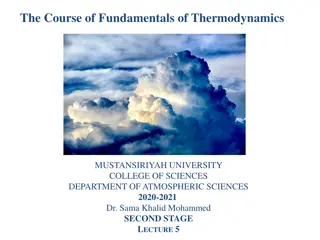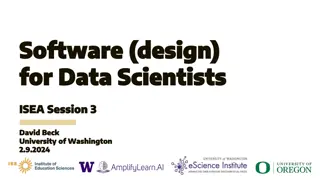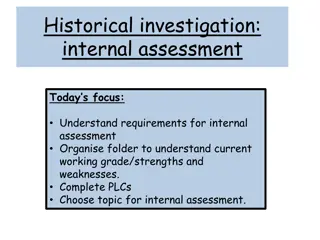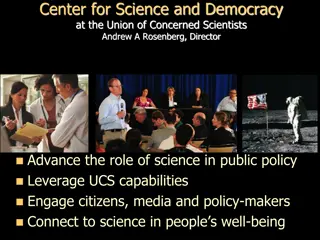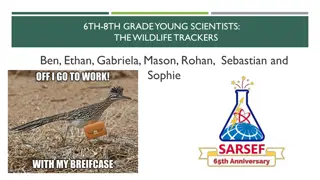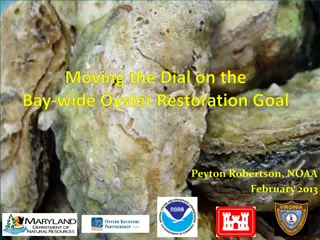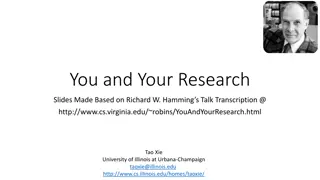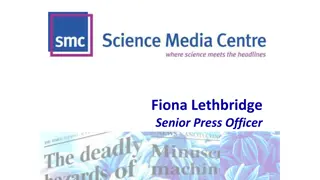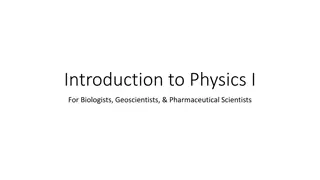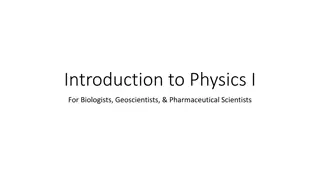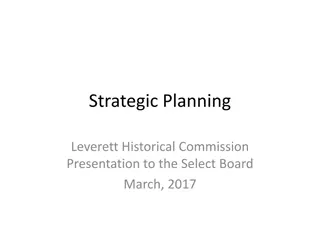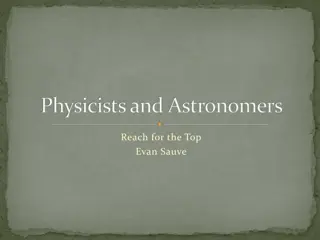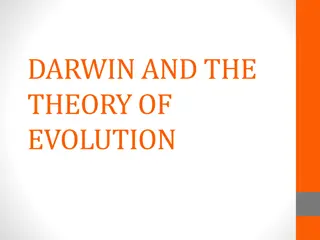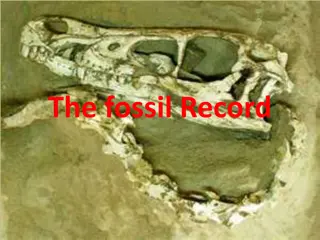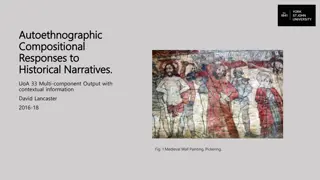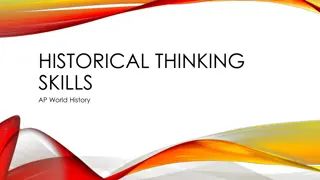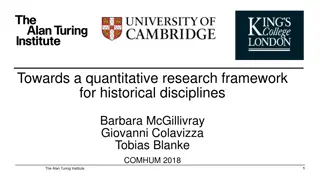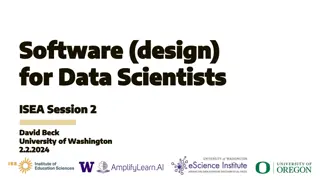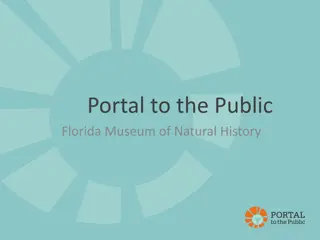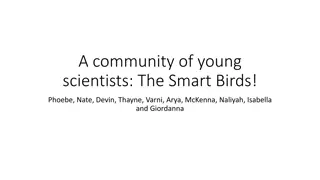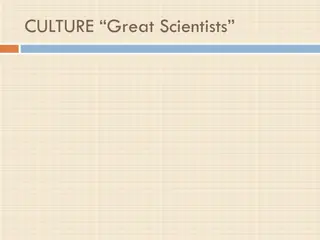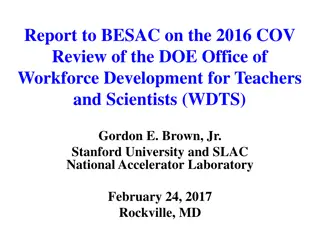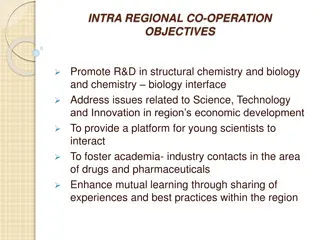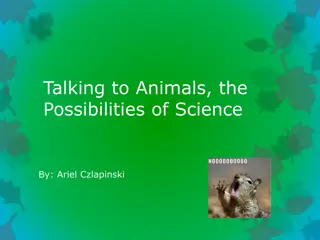Historical Sources as Evidence
Explore the importance of historical sources as evidence in the Victorian Curriculum History context, focusing on how students analyze, evaluate, and utilize sources to create historical explanations and arguments. Discover the significance of primary and secondary sources, perspectives of historica
1 views • 46 slides
Elementary Scientists and Inventors Escape Room
Explore the world of scientists and inventors through an engaging escape room activity. Dive into the lives of individuals like Elizabeth Blackwell, Ada Lovelace, and Isaac Newton by completing interactive tasks that challenge your knowledge and problem-solving skills. Uncover codes, match inventors
0 views • 24 slides
MRI BASICS & HISTORY AASIF MAJEED LONE
Magnetic Resonance Imaging (MRI) has revolutionized medical imaging, offering detailed views of the body without harmful radiation. This article delves into the historical development of MRI, highlighting key milestones such as the discoveries of the Rotating Magnetic Field by Nikola Tesla and the w
9 views • 49 slides
Understanding Algorithm Analysis and Scalability in Computer Science
Scientists and computer scientists often encounter scale differences, and scalability is crucial for accommodating growing inputs. Algorithm analysis, data structures, running times, and experimental studies are key aspects explored in the context of algorithms. Choosing the right type of plot for l
4 views • 17 slides
Unveiling the Journey of Atomic Structure Evolution
Delve into the historical perspectives and key theories that shaped our understanding of atomic structure. From Democritus' concept of indivisible atoms to Dalton's atomic theory and Thomson's discoveries on electric charges, this journey explores the evolution of atomic theory through the insights
0 views • 35 slides
Insights into Healthcare Science Careers and Specializations
Explore the diverse field of healthcare science through roles like biomedical scientists, clinical scientists, and support workers. Learn about the wide-ranging duties and specializations within the healthcare science sector, including laboratory research, equipment development, and patient care. Di
0 views • 17 slides
Challenges and Solutions in Implementing Historical Competencies in Teaching
Explore the complexities and obstacles faced in implementing historical competencies in teaching, as discussed by Jens Aage Poulsen, a senior lecturer and researcher at HistoryLab, University College Lillebaelt, Denmark. The content delves into competence-based curriculum, core historical competenci
0 views • 7 slides
Enhancing Critical Thinking Skills in Scientific Research
Critical thinking plays a pivotal role in scientific endeavors, enabling researchers to observe, hypothesize, experiment, and draw valid conclusions. Being a natural skeptic is crucial for scientists to scrutinize research papers effectively. By carefully analyzing prior findings, research technique
2 views • 20 slides
Investigating Boyle's Law: The Relationship Between Air Pressure and Volume
Explore the fascinating relationship between air pressure and volume of a confined gas at constant temperature through an experiment testing Boyle's Law. Learn about the historical context and theoretical foundation behind the behavior of gases, including the concept of ideal gases and the Boyle-Mar
0 views • 24 slides
Understanding Historical Research Methods
Historical research is a systematic approach to investigating past events, developments, and experiences. It involves critical examination of evidence, interpretation of sources, and tracing of historical trends to gain insights into social changes. Various definitions by scholars like Kerlinger, Wh
1 views • 21 slides
Understanding Historical Research: Methods, Purposes, and Aims
Historical research involves investigating past events systematically to provide a dynamic explanation, interpretation, and understanding of the past. It aims to uncover unknown aspects, answer unexplored questions, and link past happenings to the present to enrich human culture and encourage interd
0 views • 20 slides
Contributions of Greek Scientists to Modern Society
Greeks have made significant contributions to modern society through their inventions and discoveries. Without their innovations, concepts like democracy, philosophy, cartography, and navigation would be unknown. Greek scientists like Thales of Miletus, Aristotle, and Pythagoras laid the foundation
0 views • 14 slides
KORUS-AQ Timeline of Significant Events and Future Milestones
NCAR scientists explore the possibility of an aircraft experiment in Korea leading to the formation of KORUS-AQ. Collaborative efforts, meetings, and preparations are made over several years, culminating in the finalization of the International Agreement and deployment plans. The timeline showcases
0 views • 14 slides
Fundamentals of Thermodynamics: Historical Laws and Principles
This lecture explores the historical overview of thermodynamic laws, including Boyle's Law, Charles' Law, and Gay-Lussac's Law. It delves into the relationships between pressure, temperature, volume, and amount in ideal gases, providing useful insights for meteorologists and atmospheric scientists.
0 views • 23 slides
Understanding Software Design Principles for Data Scientists
Explore the importance of clear design in software development for data scientists, learning from past failures like the Therac-25 incident. Dive into creating understandable designs, user stories, and the significance of simplicity and careful feature selection. Follow a practical example in design
0 views • 88 slides
Requirements for Historical Investigation Internal Assessment
Understand the 25% weightage internal assessment comprising 3 sections for a historical investigation. Focus on source evaluation, investigation, and reflection within a 2,200-word limit. Choose a historical topic, analyze primary and secondary sources, and consider causation, consequence, continuit
0 views • 18 slides
Understanding Historical Context in Skills Development Discourses
Exploring the evolution of apprenticeship and skills development through historical sociology, historical futures, modes of justification, and complexity concepts. Emphasizing the importance of nuanced historical understanding to navigate contemporary challenges in South Africa's skills development
0 views • 29 slides
Advancing Science in Public Policy: The Role of the Union of Concerned Scientists
The Center for Science and Democracy at the Union of Concerned Scientists, led by Director Andrew A. Rosenberg, aims to promote the role of science in public policy by leveraging UCS capabilities and engaging citizens, media, and policymakers. Strengthening the voice for science through the UCS Scie
0 views • 5 slides
Young Scientists Investigate Wildlife Behavior and Habitat Effects
The Wildlife Trackers, a group of young scientists, conducted a study to understand how the presence of people and different habitats affect the behavior and flight responses of animals in their neighborhood. By measuring flight response distances of various animals like birds, lizards, and rabbits,
0 views • 11 slides
Oyster Restoration Efforts in Chesapeake Bay
Efforts are underway to restore oyster populations in Chesapeake Bay tributaries by 2025. Various workgroups, stakeholders, and scientists are collaborating to define restoration goals, develop tributary plans, conduct population surveys, and manage the restoration process. The Harris Creek tributar
0 views • 17 slides
Characteristics of Great Scientists: Insights from Richard W. Hamming's Talk
Explore the essential characteristics of great scientists as outlined by Richard W. Hamming. Delve into the role of luck, courage, age, and working conditions in shaping scientific success. Gain valuable perspectives on the mindset and approach necessary for making impactful contributions in the fie
0 views • 37 slides
Discover Faculty Opinions: A Platform for Scientific Insights
Faculty Opinions, powered by F1000 Prime, is a platform where over 8,000 leading life scientists nominate and review important research articles. With personalized alerts and expert commentary, scientists can stay updated on groundbreaking discoveries without sifting through vast amounts of literatu
0 views • 25 slides
Celebrating Efforts of Scientists, Statisticians, and Journalists: Promoting Access to Best Science and Engaging the Experts
There is much to appreciate in the collaborative efforts of scientists, statisticians, and journalists in ensuring accurate and relevant information reaches the public. With the rising politicization of science, it is crucial to maintain access to the best scientific knowledge for journalists and en
0 views • 8 slides
Introduction to Physics I for Biologists, Geoscientists, & Pharmaceutical Scientists
Delve into the fundamental concepts of physics tailored for biologists, geoscientists, and pharmaceutical scientists. Explore key principles and applications in a concise and engaging manner, enhancing your understanding of the physical world around us.
0 views • 4 slides
Physics Course for Biologists, Geoscientists, and Pharmaceutical Scientists
This physics course tailored for biologists, geoscientists, and pharmaceutical scientists covers lectures, exercises, and exams in both English and German. The course includes weekly exercise sessions, recommended literature, exam details, and study materials available on the course website. Student
0 views • 15 slides
Leverett Historical Commission Strategic Planning Presentation Overview
Leverett Historical Commission identifies issues with ad hoc requests, lack of clarity on historical property significance, and inadequate maintenance plans. A strategic plan is needed to define assets, determine significance, create guidelines, prioritize restoration efforts, and establish funding
0 views • 9 slides
Influential Scientists in History: Newton, Hawking, Einstein, and Kepler
Explore the remarkable contributions of influential scientists from different eras - Sir Isaac Newton, Stephen Hawking, Albert Einstein, and Johannes Kepler. Learn about Newton's laws of motion, Einstein's theory of relativity, Hawking's work on black holes, and Kepler's laws of planetary motion.
0 views • 10 slides
Darwin and the Theory of Evolution: A Comprehensive Overview
Darwin's Theory of Evolution encompasses the concepts of organisms changing over time and life evolving through natural selection. Influenced by scientists such as James Hutton, Jean Baptiste Lamarck, and Alfred Russel Wallace, Darwin's theory culminates in the idea of evolution by natural selection
0 views • 9 slides
Understanding Fossils: Formation, Types, and Significance
Explore the world of fossils and learn about their formation process, different types such as mold, cast, and petrified fossils, and the valuable insights they provide to scientists. Discover how fossils capture the remains of ancient plants and animals, revealing clues about the past through their
0 views • 25 slides
Exploring Historical Narratives through Music and Art
This submission presents two original compositions that delve into historical narratives through a unique blend of music and visual art. The compositions aim to reinterpret stories from the past, creating innovative structures and forms. By intertwining various perspectives and utilizing cinematic t
0 views • 8 slides
Historical Source Analysis Exam Questions Overview
The provided content outlines exam questions related to historical sources, guiding students on analyzing, evaluating, and interpreting information from different sources. The questions cover a range of topics such as learning from sources, assessing accuracy, understanding significance, and making
0 views • 12 slides
Developing Historical Thinking Skills in AP World History
AP History classes aim to cultivate apprentice historians by fostering historical thinking skills (HTS). These skills include Chronological Reasoning, Comparison and Contextualization, Crafting Historical Arguments, and Historical Interpretation. Each skill set equips students with the ability to an
0 views • 15 slides
Quantitative Research Framework for Historical Disciplines
Scholarly communities in historical disciplines are combining quantitative and qualitative methods to study phenomena that change over time. The proposed general methodological reflection aims to enhance research in historical linguistics through quantitatively driven models and claims. Quantitative
0 views • 18 slides
Understanding the Importance of Software Design for Data Scientists
Today's ISEA Session 2 with David Beck from the University of Washington delves into the critical role of intentional software design for data scientists. The session covers the software design approach, user-centric design stories, use cases, components, testing strategies, and the benefits and dra
0 views • 76 slides
Exploring the Portal to the Public at the Florida Museum of Natural History
The Portal to the Public program at the Florida Museum of Natural History aims to bridge the gap between scientists and the public through interactive sessions. The program focuses on informal science education, STEM learning, and science communication workshops for scientists. Funded by the Nationa
0 views • 15 slides
Insights from Young Scientists on How Temperature Affects Bird Behavior
A group of young scientists known as the Smart Birds conducted a study on how temperature influences bird behavior. Through observations recorded in the morning and late afternoon, they found that birds were most active when the temperature ranged between 71-90 degrees Fahrenheit. The study revealed
0 views • 14 slides
Great Scientists Who Shaped Our World
Discover the remarkable contributions of renowned scientists like Galileo, Louis Pasteur, Karl Landsteiner, Francis Crick, James Watson, and Jane Goodall. From revolutionizing astronomy to groundbreaking discoveries in microbiology and genetics, these brilliant minds have left a lasting impact on me
0 views • 8 slides
Review of DOE Office of Workforce Development for Scientists
Assessment of the 2016 review of the Department of Energy's Office of Workforce Development for Teachers and Scientists (WDTS) including its mission, programs reviewed, charges, and additional considerations to enhance workforce development in STEM fields.
0 views • 25 slides
Strategies for Enhancing Scientific Collaboration in South Asia
This content highlights the objectives of intra-regional co-operation to promote R&D in structural chemistry and biology, address science, technology, and innovation issues, create platforms for young scientists, foster academia-industry contacts in pharmaceuticals, and share best practices within t
0 views • 4 slides
Could Humans Really Talk to Animals? Exploring the Potential Through Science
Discover the fascinating world of communication between humans and animals as scientists delve into the possibility of translating thoughts and ideas across species boundaries. From Nim Chimpsky to Alex the African grey parrot, examples show how intelligent creatures can learn to communicate through
0 views • 5 slides
